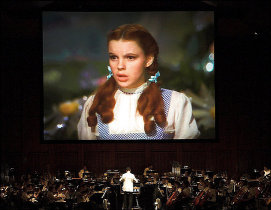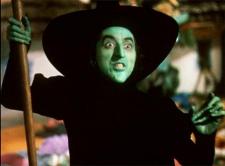Heinrich Biber: Man of Mysteries
August 12, 2006
_________________________________________________________ Born today in 1644: the unconventional composer Heinrich Ignaz Franz von Biber, whose works are so complex, idiosyncratic and wildly inventive that he's sometimes compared with Charles Ives.
Born today in 1644: the unconventional composer Heinrich Ignaz Franz von Biber, whose works are so complex, idiosyncratic and wildly inventive that he's sometimes compared with Charles Ives.
Biber's best known for his "Mystery Sonatas" for violin, which date from about 1670. Hunt them down and feast; with their unconventional scordatura tuning and relentless spiritual intensity, they've become practically the object of cult worship . Rachel Barton Pine played the glorious Passacaglia for solo violin (a set of 65 variations on a baroque ground base) at her recital here at the National Gallery of Art in March. Aside from being a tour-de-force of violin technique -- with more virtuoso passagework, complex double- and triple-stopping and springing bowings than you could shake a bow at -- this was music of pure scorching radiance and power.
Musicologist and Biber specialist James Clements has a good essay on the violin works, with some more general information on the composer here. Downloadable scores of much of Biber's music (including the Passacaglia) are available here.
Music from Jupiter; Mozart's subscriber base; and a little scratchy spirituality
August 11. 2006
_________________________________________________________ 
Courtesy NASANot strictly music, but have a look at this astonishing short film from NASA. It's an animation of photos taken by the Huygens space probe as it descended to the surface of one of the moons of Jupiter last year -- and has one of the most accidentally beautiful soundtracks in the solar system.
Other flotsam and jetsam off the net: West coast inventor Ryuichi "Richie" Iwamura has a little melody search engine online for the memory-challenged -- you tap out a melody on an on-screen keyboard, and it identifies it for you .... young composers can "communicate, share, and collaborate with other musicians" at (where else?) the Young Composers Forum .... dozens of rare and beautiful early scores are now online at Harvard's Loeb Music Library -- check out the 1794 adaptation of Mozart's Symphony in E flat Major, K. 543, with its list of subscribers who made (or, toward the end of Mozart's life, often failed to make) new compositions possible .... and the University of California, Santa Barbara has put a bunch of its collection of 6,000 early cylinder recordings online. Plenty of treasures here, from early string quartet recordings to William Jennings Bryan lecturing on immortality and E.H. Shackleton explaining his south polar expedition.
Personally, I'm partial to the spirituals.
Munchkins, Mendelssohn and Flying Monkeys
August 7, 2006
___________________________________________________________________________
Emil de Cou conducts the NSO Photo by Joe BellOut to Wolf Trap on Saturday night, for a screening of "The Wizard of Oz" with the NSO performing the music.
The evening was beautiful, with that luminous glow you get right after sunset. Crickets thrummed in the trees; a cool breeze was coming in from the West. Families spread blankets out on the lawn and opened their picnic baskets. A couple of girls were dressed as Dorothy in blue gingham and pigtails, but no Totos.
We took our seats; Christina on one side, in be-quiet-I'm-thinking mode, and an impatient Leila on the other, singing the theme song from "Jeopardy!" through a rolled-up program and butting me affectionately with her head.
There's no place like home.
Here's the review:
The Washington Post 8/7/06: It was easy to get to Oz on Saturday night. All you had to do was go Over the Beltway and Follow the Dulles Toll Road to Wolf Trap, where the classic 1939 movie "The Wizard of Oz" was being screened -- with the music performed live by the National Symphony Orchestra.
And is there any better way to experience this feast of a musical? Aside from the unforgettable songs by E.Y. Harburg and Harold Arlen, the Oscar-winning score by Herbert Stothart uses everything from pop songs of the day ("Where, Oh Where, Has My Little Dog Gone?") to snippets from the classical repertoire. Robert Schumann's "Frolicher Landmann" surfaces in the Kansas scenes, you can hear a bit of Mendelssohn when Toto escapes from the Wicked Witch, and Mussorgsky's "Night on Bald Mountain" accompanies the chase scene in the castle.
Aside from the unforgettable songs by E.Y. Harburg and Harold Arlen, the Oscar-winning score by Herbert Stothart uses everything from pop songs of the day ("Where, Oh Where, Has My Little Dog Gone?") to snippets from the classical repertoire. Robert Schumann's "Frolicher Landmann" surfaces in the Kansas scenes, you can hear a bit of Mendelssohn when Toto escapes from the Wicked Witch, and Mussorgsky's "Night on Bald Mountain" accompanies the chase scene in the castle.
But on the recorded soundtrack, much of the subtlety is drowned by the beating of monkey wings and the pitter-patter of Munchkin feet -- which inspired NSO Associate Conductor Emil de Cou to attempt the live event.
"It's the most difficult thing I've ever done," he said before the performance, noting that the precise synchronization leaves no room for error.
But de Cou and the NSO brought it off with near-perfection. Unsuspected textures and details emerged with vivid clarity, and the powerful moments roared. It wasn't always easy to make out the movie's recorded dialogue -- the amplification was muddy and the orchestra sometimes surged a bit too strongly -- but the songs all rang out brilliantly, as if just released from long captivity. Oz never sounded better.
The Dark Side of the Rainbow
August 5, 2006
________________________________________________________________ I'm taking the little darlings out to Wolf Trap tonight for what should be huge fun: A screening of The Wizard of Oz, with the soundtrack played live by the National Symphony Orchestra.
I'm taking the little darlings out to Wolf Trap tonight for what should be huge fun: A screening of The Wizard of Oz, with the soundtrack played live by the National Symphony Orchestra.
NSO Associate Conductor Emil de Cou will be at the helm, and he's sounding a little nervous about the whole enterprise.
“Leading a symphony orchestra in a live real-time re-creation of a film score is like making a basket from half-court without hitting the rim 15 times in a row,” he says. “The orchestra can't see the film… and if you get off-synch for a quarter of a second, it takes half a minute to recover. I watch Judy Garland's breathing, and I stare at every single Munchkin foot. It's the most difficult thing I've ever done, but I enjoy it immensely.”
I went a-googling this morning to get some background info on Herbert Stothart (who wrote the Oscar-winning incidental music), and stumbled on the wonderful stoner theory that Pink Floyd’s 1973 album, "Dark Side of the Moon," was actually written as a soundtrack to The Wizard of Oz.
Have you heard about this? There's a mini-subculture out there claiming that if you start playing "Dark" at exactly the right point in the film's opening credits (just at the third roar of the MGM lion), you'll see an incredible synchronicity between the two -- and unlock the hidden meaning of Pink Floyd's music.
Hmm. Believers point to more than 100 corresponding moments which are too perfect to be explained away as mere coincidence. For instance: During the song “Breathe,” Dorothy tightrope-walks along a fence to the lyric "balanced on the biggest wave." A little later, she gallops off to save Toto to the words "no one told you when to run" (from “Time”). When the Wicked Witch of the West (dressed in black) confronts Dorothy (dressed in blue), the lyrics are "Black... and blue." When the Scarecrow sings “If I Only Had a Brain,” the corresponding song is "Brain Damage" – and when he's flopping around on the ground, the lyrics go: "The lunatic is on the grass." Capping everything is the heartbeat heard at the end of the album -- which comes just as Dorothy listens to the Tin Man’s chest.
Not convinced? Neither is Pink Floyd, on record as saying it’s all nonsense. Anyway, judge for yourself: there are pre-synched dvd's out there in the cyber-mall, and Google video has a 43-minute clip online. You bring the bong, I’ll bring the munchies, and we’ll get to the bottom of this.
Also: De Cou led the NSO on Thursday night at Wolf Trap in a wish-I'd-been-there program that featured Renee Fleming singing Samuel Barber's beautiful "Knoxville: Summer of 1915". The Post's Joan Reinthaler wrote an engaging review of the concert, which also featured rain, a blackout and "an increasingly insistent obbligato of crickets, thunder and lightning." Also at the concert was JFL from ionarts, who covered it in more depth.
Elisabeth Schwarzkopf passes away at 90
August 4, 2006
_______________________________________________________________ The acclaimed soprano Elisabeth Schwarzkopf died yesterday at 90. A formidable figure in both opera and lieder, she was much-loved, even adored. As The LA Times' Mark Swed says, "all it took was a short Schubert song for her to wrap an audience around her little finger. And once she had you, she never let go."
The acclaimed soprano Elisabeth Schwarzkopf died yesterday at 90. A formidable figure in both opera and lieder, she was much-loved, even adored. As The LA Times' Mark Swed says, "all it took was a short Schubert song for her to wrap an audience around her little finger. And once she had you, she never let go."
And yet, some of us never quite got hooked -- in fact, were left a bit chilled by her mannered and infinitely-calculated delivery. The voice may have been pure silver, but (to these ears, anyway) all that glittering perfectionism felt contrived, ruthlessly purged of any unsightly human naturalness or intuitive depth. You can't help but respect her musicianship, her hard work, her enormous contributions (not least resurrecting the songs of Hugo Wolf). But did her singing feed the soul?
NPR's Tom Huizenga has a fairly sympathetic audio piece on her (he recalls the famous story that Schwarzkopf, when asked for her "desert island" list, offered eight of her own recordings), and The Washington Post's Tim Page pays balanced homage: "The cliche about the forest and the trees could be adapted for Schwarzkopf: There were times when one could hardly hear the music for the interpretation," he writes. "Nevertheless, she was a very great artist, one who combined a lustrous and opulent voice, a thespian's gift for intimate characterization, a sharp, creative intelligence and an innate artistic dignity."
Tony Snow plays the blues
August 3, 2006
___________________________________________________________
White House press secretary Tony Snow plays the flute? Who knew? Seems to be channelling the great Jeremy Steig in this clip, playing "Stormy Monday" with Leslie West of Mountain. (Via mediabistro.)
Books for the heat
July 31, 2006
__________________________________________________________
With temperatures in DC hovering around 100 degrees this week, why risk actual physical movement? The Post's Tim Page takes a frank and entertaining look at the latest crop of books on classical music in Sunday's Post, if you're looking for an excuse to curl up by the air conditioner and just read for a few days.
 Page gives high marks to the just-released second volume of Stephen Walsh's epic biography of Stravinsky ("Stravinsky: The Second Exile: France and America 1934-1971"), which covers a difficult period in the composer's life (revolving, to large degree, around the complex relationship with Robert Craft). Written with "precision, elegance and grace," says Page, the work is "one of the best books ever written about a musician."
Page gives high marks to the just-released second volume of Stephen Walsh's epic biography of Stravinsky ("Stravinsky: The Second Exile: France and America 1934-1971"), which covers a difficult period in the composer's life (revolving, to large degree, around the complex relationship with Robert Craft). Written with "precision, elegance and grace," says Page, the work is "one of the best books ever written about a musician."
He also has praise for Phillip Ramey's "altogether admirable" new book, "Irving Fine: An American Composer in His Time", but tears Edward Said's "On Late Style: Music and Literature Against the Grain" into tiny, whimpering shreds. The well-known Orientalist, says Page, comes across "as an unusually pompous tourist in the world of classical music, doing his best to hide his general befuddlement with a torturously expressed string of dubious 'insights'."
 On the other hand, Joseph Volpe's revealing memoir -- "The Toughest Show on Earth: My Rise and Reign at the Metropolitan Opera" -- comes off as virtually irrestisible: "one of those much-ballyhood 'insider books' that actually delivers the goods."
On the other hand, Joseph Volpe's revealing memoir -- "The Toughest Show on Earth: My Rise and Reign at the Metropolitan Opera" -- comes off as virtually irrestisible: "one of those much-ballyhood 'insider books' that actually delivers the goods."
Walsh's bio of Stravinsky sounds like essential reading; also check out the engaging, in-depth review by Michael Kimmelman in the August 10 New York Review of Books.
On my own bedside table this week is Solomon Volkov's fascinating "Shostakovich and Stalin", an often dramatic account of artistry under dictatorship. Volkov, of course, was behind the alleged Shostakovich memoirs published in 1979 as "Testimony" -- now widely thought to be a fraud. So you approach Volkov warily; but his lively and thought-provoking account is worth reading in this Shostakovich anniversary year. Also on my table: "Shostakovich: A Life" by Laurel E. Fay -- the scholar who effectively exposed the truth about "Testimony." (For a good account of the case, see Alex Ross' 2004 piece in The New Yorker.) Should be an interesting week.

